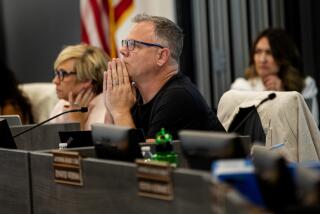Ploy Helps 2 in Azusa Stay On in Recall Bid
- Share via
A move to recall two Azusa city councilmen has failed after a campaign that featured a novel technique to fight the ouster attempt.
A group called the Azusa Taxpayers Assn. used a little-noticed provision of the state Elections Code to to give people who signed the recall petitions a way to change their minds. The group mailed each registered voter in the San Gabriel Valley city a packet that contained a post card designed to be sent to the city clerk, officially requesting removal of their signatures.
State election officials and political consultants said the post-card campaign was the first such anti-recall effort they know of. Under the Elections Code, any voter who signs a recall petition can make a written request to have his name removed, according to Caren Daniels-Meade, media director for the secretary of state’s office.
In the end, however, the costly post-card campaign was not the decisive factor in the failure of the effort to force a vote to recall City Councilmen Harry L. Stemrich and Tony D. Naranjo.
102 Signatures
Azusa City Clerk Adolph A. Solis announced Thursday that, in the end, 102 signatures had been nullified by post cards. But even without those disqualifications, the two recall efforts would still have fallen about 30 signatures short of the 2,806 required to hold a special election, Solis said.
“They made such a big deal about the (post card) withdrawals,” Solis said. “Now, we can see that they have had very little effect.”
Of 3,578 signatures submitted in favor of Stemrich’s recall, 800 were invalidated by the county Register-Recorder for reasons other than withdrawal by the signer. More than 770 of the 3,556 signatures calling for Naranjo’s recall were similarly thrown out.
Most of the invalid signatures were rejected because the signers were not registered voters, did not live in Azusa, gave a wrong address or no address, or had already signed the petition.
“I guess the cards were really not needed,” Naranjo said.
The Azusa councilman predicted, however, that the post-card ploy would catch on as a way to combat “misinformation” used by petition circulators. “I think most of the people signed (the recall petition) under false pretenses, so after getting more accurate information, they were able to take their name off,” he said.
Count Challenged
Art West, co-chairman of the recall committee, immediately challenged the signature count and said he will go to the Register-Recorder’s office with Solis next week to review the petitions. But West said he does not expect this to change the outcome.
“We gambled that 3,600 signatures would be enough,” he said. “It would appear that the recall has failed. If that is the case and I can go down and verify it, I’ll be the first to say so.”
The recall effort was launched after the two councilmen cast crucial votes in December to renew the operating permit of a local quarry, the Azusa Rock Co., which some residents complained was a nuisance.
Azusa Rock and a group of other companies that rely on rock products bankrolled all but about $400 of the anti-recall campaign, which outspent the recall organizers by $48,074 to $944, a margin of 50 to 1.
After the controversial vote on the quarry permit, Azusa Rock was purchased by former competitors CalMat Co. and Owl Rock Products Co. CalMat and a subsidiary contributed $13,500 to the anti-recall effort.
More to Read
Sign up for Essential California
The most important California stories and recommendations in your inbox every morning.
You may occasionally receive promotional content from the Los Angeles Times.










